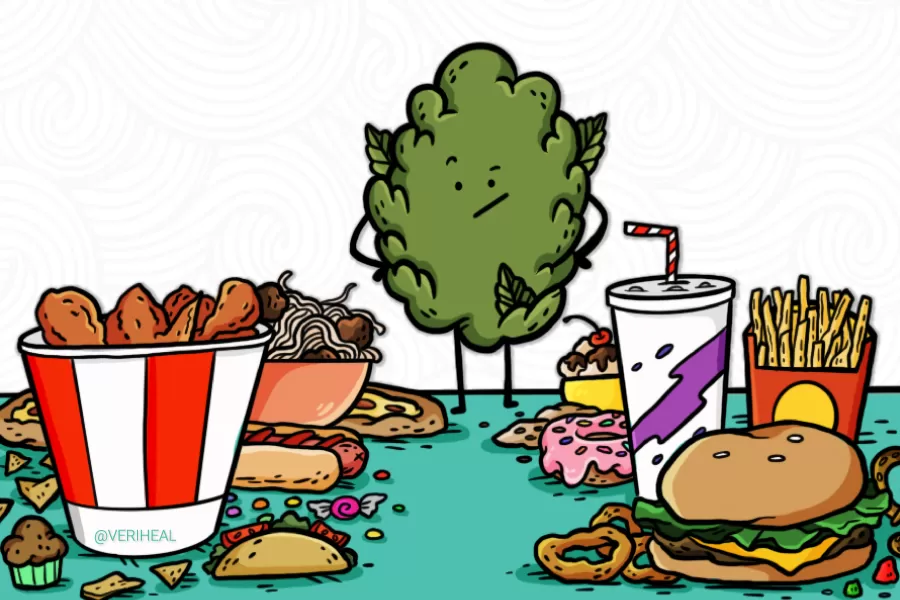
In the ever-evolving landscape of recreational and medicinal cannabis use, Canadians have embraced the newfound freedoms that legalization has brought. From the therapeutic relief to the simple enjoyment of its recreational use, cannabis has become an integral part of many people’s lives. However, amidst the pleasures that cannabis can offer, there are also perils that users may encounter. One such challenge is the notorious phenomenon known as “the munchies.”
The munchies, characterized by an insatiable appetite and cravings for food, are a well-documented side effect of cannabis consumption. While the experience varies from person to person, many users find themselves irresistibly drawn to snacks and indulgent treats after partaking in cannabis. This phenomenon has long been a subject of fascination and curiosity among researchers and consumers alike, prompting questions about its underlying mechanisms and implications for health and wellness.
For individuals who wish to enjoy the benefits of cannabis without succumbing to the temptations of excessive eating, the quest for control over the munchies becomes paramount. Fortunately, there are various strategies and techniques that can help mitigate the effects of the munchies and regain a sense of balance and moderation. From mindful consumption practices to lifestyle adjustments and informed strain selection, users have a range of tools at their disposal to navigate the munchie maze and reclaim agency over their eating habits.
At the heart of the munchies phenomenon lies the interaction between cannabis and the human body’s endocannabinoid system. Tetrahydrocannabinol (THC), the primary psychoactive compound in cannabis, interacts with cannabinoid receptors in the brain, including those involved in appetite regulation. Research suggests that THC can stimulate the release of certain neurotransmitters and hormones, such as dopamine and ghrelin, which play key roles in triggering hunger and enhancing the perception of food’s palatability. This neurochemical cascade can lead to an increased appetite and a heightened sensitivity to food cues, contributing to the intense cravings commonly experienced during the munchies.
Beyond the physiological effects of THC, the munchies can also be influenced by psychological factors. Cannabis consumption is often associated with mood enhancement and relaxation, which can create a heightened sense of pleasure and enjoyment surrounding eating experiences. Additionally, individuals may turn to food as a means of seeking comfort or alleviating stress, further reinforcing the association between cannabis use and indulgent eating habits. Moreover, the sensory enhancement and altered perception of time and space induced by cannabis can intensify the pleasure derived from food, making it all the more enticing during the high.
In addition to its physiological and psychological effects, the munchies phenomenon is also shaped by social influences within the culture of cannabis consumption. From shared experiences among friends to popular depictions in media and entertainment, the association between cannabis use and indulgent eating has become deeply ingrained in popular culture. Whether it’s the stereotypical image of the “stoner” raiding the fridge or the communal ritual of enjoying snacks during a smoke session, social norms and expectations surrounding cannabis consumption can contribute to the normalization and acceptance of overeating while high. As a result, individuals may feel a sense of camaraderie and belonging when engaging in munchie-related behaviors, further reinforcing the association between cannabis and food indulgence.
One of the fundamental strategies for managing the munchies is to approach cannabis consumption with mindfulness and moderation. By carefully controlling dosage and monitoring individual tolerance levels, users can minimize the intensity of the munchies without sacrificing the desired effects of cannabis. Starting with lower doses and gradually increasing as needed allows users to find the sweet spot where they can enjoy the benefits of cannabis while mitigating excessive hunger cravings. Experimenting with different consumption methods, such as using vaporizers or consuming edibles with controlled THC content, can provide more predictable and manageable experiences, reducing the likelihood of overindulgence.
When faced with the urge to indulge in excessive eating during a cannabis high, distraction and diversion can be powerful tools for curbing the munchies. Engaging in alternative activities that capture attention and stimulate the senses can help shift focus away from food cravings and redirect energy towards more constructive pursuits. Whether it’s immersing oneself in a creative project, going for a walk in nature, or engaging in physical exercise, finding enjoyable and fulfilling activities can provide a much-needed distraction from the temptation to overeat.

When the munchies strike, it’s important to make mindful choices when selecting snacks to satisfy cravings. Instead of reaching for processed or high-calorie foods, opt for healthier alternatives that nourish the body and support overall health. Stocking up on nutrient-dense snacks such as fruits, vegetables, nuts, and seeds ensures that there are plenty of wholesome options readily available when hunger strikes. Incorporating protein-rich foods and fibre-packed snacks can also help promote satiety and prevent overeating, keeping cravings in check while providing essential nutrients for optimal functioning.
Staying hydrated is essential for maintaining overall health and well-being, especially when managing the munchies induced by cannabis consumption. Drinking water throughout the day helps keep the body hydrated and can also help curb appetite by creating a sensation of fullness. When experiencing the munchies, reaching for a glass of water instead of snacks can help quench thirst and alleviate cravings without adding extra calories. Additionally, flavoured sparkling water or herbal teas can provide a refreshing alternative to sugary beverages and contribute to feelings of satisfaction and satiety.
Incorporating cannabidiol (CBD) into cannabis consumption can help balance the psychoactive effects of THC and mitigate the intensity of the munchies. CBD, a non-psychoactive compound found in cannabis, has been shown to modulate the effects of THC and reduce its propensity to induce hunger and overeating. By incorporating CBD-rich strains or CBD-infused products into their cannabis regimen, users can enjoy the therapeutic benefits of cannabis while minimizing unwanted side effects such as excessive appetite stimulation. CBD has been studied for its potential appetite-suppressing properties, making it a valuable tool for managing the munchies and promoting overall balance and well-being.
Anticipating and preparing for post-cannabis cravings through meal planning can help individuals stay on track with their dietary goals and minimize the temptation to overeat. By prepping healthy and satisfying meals and snacks in advance, users can ensure that nutritious options are readily available when hunger strikes. Incorporating a balance of protein, carbohydrates, and healthy fats into meals helps promote satiety and prevents the onset of ravenous cravings. Having a variety of pre-portioned snacks on hand, such as cut-up fruits and veggies, yogurt, or trail mix, allows individuals to satisfy cravings without succumbing to unhealthy indulgences.
Recognizing and addressing emotional triggers that contribute to overeating during cannabis consumption is essential for effectively managing the munchies. Stress, anxiety, and other negative emotions can exacerbate cravings and lead to mindless eating behaviours, undermining efforts to maintain a balanced and healthy lifestyle. Developing coping strategies for managing stress, such as mindfulness meditation, deep breathing exercises, or journaling, can help individuals cultivate a sense of calm and resilience in the face of emotional challenges. Engaging in activities that promote relaxation and self-care, such as taking a warm bath, practicing yoga, or spending time outdoors, can also help alleviate stress and reduce the urge to seek comfort in food.
Engaging in regular physical activity can be an effective strategy for managing the munchies and maintaining a healthy balance between cannabis consumption and overall well-being. Exercise not only helps to burn calories and boost metabolism but also provides a natural outlet for excess energy and cravings. By harnessing the energy and euphoria often associated with cannabis use, individuals can channel their high into productive and enjoyable physical activities such as jogging, cycling, or yoga.
Moreover, exercise has been shown to have mood-enhancing effects, reducing stress and anxiety levels that may contribute to overeating. Incorporating a variety of physical activities into one’s routine not only helps to counteract the sedentary effects of cannabis but also promotes a sense of vitality and empowerment, empowering individuals to make healthier choices and maintain a balanced lifestyle.

Establishing a consistent routine for meals and snacks can help regulate eating patterns and minimize the impact of the munchies on dietary habits. Eating at regular intervals throughout the day helps to stabilize blood sugar levels and prevent extreme fluctuations that can trigger hunger and cravings. By planning and adhering to a structured eating schedule, individuals can better anticipate and manage post-cannabis cravings without succumbing to impulsive or excessive eating.
Additionally, incorporating balanced meals that include protein, fibre, and healthy fats helps to promote satiety and prevent overindulgence. Consistency is key when it comes to establishing healthy eating habits, and by prioritizing routine and consistency, individuals can regain control over their eating patterns and maintain a sense of balance and moderation.
Navigating the challenges of managing the munchies can be easier with the support and camaraderie of peers who share similar goals and experiences. Seeking support from friends, family, or online communities can provide valuable insights, encouragement, and accountability when it comes to managing cravings and maintaining a healthy lifestyle. Sharing strategies and tips for munchie management, discussing challenges and successes, and celebrating milestones and achievements can help individuals feel supported and motivated on their journey towards wellness. Engaging in open and honest conversations about cannabis use and its effects can help reduce stigma and promote a greater understanding of the complexities involved in managing consumption.
Practicing mindfulness during meals and snacks can help individuals cultivate a greater awareness of their eating habits and enhance the sensory experience of food. By slowing down and savoring each bite, individuals can fully appreciate the flavors, textures, and aromas of their food, leading to a more satisfying and fulfilling eating experience. Mindful eating involves paying attention to hunger and fullness cues, eating slowly and deliberately, and acknowledging the emotions and sensations that arise during eating.
By tuning into the body’s signals and listening to its needs, individuals can develop a deeper connection with food and cultivate a healthier relationship with eating. Additionally, practicing mindfulness can help individuals distinguish between true hunger and cravings triggered by cannabis, allowing for more conscious and intentional choices when it comes to nourishing the body.
Creating a nurturing environment is essential for managing munchies effectively. Surrounding yourself with supportive influences, whether it be friends, family, or a positive online community, can provide encouragement and motivation on your journey to managing cravings. Building a network of individuals who understand your goals and can offer guidance and support during challenging times can be invaluable. Additionally, cultivating a positive and uplifting atmosphere in your living space, with comforting decor, soothing music, and stress-relieving activities, can help create a sense of calm and tranquility that reduces the likelihood of succumbing to impulsive eating habits.
Designing a munchie-proof space involves creating an environment that supports healthy eating habits and minimizes the temptation to indulge in excessive snacking. This can include organizing your kitchen and pantry to prioritize nutritious foods while minimizing the presence of high-calorie, processed snacks. Stocking up on healthy, satisfying options such as fruits, vegetables, nuts, and whole grains ensures that you have nourishing alternatives readily available when cravings strike. Additionally, keeping portion sizes in check by pre-portioning snacks into single servings can prevent overeating and promote mindful consumption. Creating designated eating areas free from distractions such as television or screens can also help foster a mindful eating environment, allowing you to fully savour and enjoy your food without mindlessly consuming calories.

Exploring outdoor activities provides a refreshing and rejuvenating way to combat cravings and distract yourself from the urge to overeat. Spending time in nature has been shown to reduce stress levels, improve mood, and increase feelings of well-being, making it an ideal antidote to munchie-induced cravings. Whether it’s going for a hike, taking a leisurely walk in the park, or enjoying a picnic by the water, engaging in outdoor activities allows you to reconnect with the natural world and focus your attention on the beauty and serenity of your surroundings.
The selection of cannabis strains plays a crucial role in determining the intensity of the munchies and overall cannabis experience. High-CBD strains, characterized by elevated levels of cannabidiol and lower concentrations of THC, offer a promising avenue for mitigating the munchie effects associated with cannabis consumption. CBD has been shown to modulate the effects of THC and counteract its appetite-stimulating properties, leading to a more balanced and controlled high.
Moreover, CBD is renowned for its anxiolytic and mood-stabilizing effects, which can help reduce stress and anxiety levels that may contribute to overeating. Incorporating high-CBD strains into one’s cannabis regimen provides a valuable tool for managing the munchies and promoting a more enjoyable and sustainable cannabis experience.
In addition to cannabinoid content, the aromatic compounds known as terpenes present in cannabis can also influence appetite and eating behaviour. Certain terpenes, such as humulene and pinene, have been shown to possess appetite-suppressing properties, counteracting the effects of THC and reducing the intensity of the munchies. By understanding the unique terpene profiles of different cannabis strains, individuals can make informed choices that align with their desired effects and preferences.
Strains rich in appetite-suppressing terpenes offer an alternative approach to managing the munchies, allowing users to enjoy the therapeutic benefits of cannabis without experiencing excessive hunger or cravings. Moreover, terpenes contribute to the complex bouquet of aromas and flavors that characterize each strain, enhancing the sensory experience and adding depth to the overall cannabis experience.
Ultimately, the role of strain selection in managing the munchies is highly individualized, and finding the right balance requires experimentation and exploration. Each person’s unique biochemistry, tolerance, and preferences play a significant role in determining how they respond to different cannabis strains and products. Some individuals may find that high-CBD strains offer effective relief from the munchies, while others may prefer strains rich in appetite-suppressing terpenes or balanced THC-to-CBD ratios. Additionally, factors such as consumption method, dosage, and timing can also influence the overall cannabis experience and the intensity of the munchies.
By taking a personalized approach to strain selection and consumption, individuals can tailor their cannabis regimen to suit their specific needs and goals, achieving a more enjoyable and fulfilling experience while minimizing unwanted side effects. Experimenting with different strains, observing their effects, and listening to the body’s signals can help individuals fine-tune their cannabis routine and strike the perfect balance between indulgence and moderation.
The journey of managing the munchies amidst the cannabis experience is a multifaceted exploration that encompasses both pleasure and challenges. As users navigate the maze of cravings and indulgence, it’s essential to embrace the unique sensations and experiences that cannabis offers. From the euphoria of the high to the sensory delight of savouring flavours and aromas, each moment presents an opportunity for self-discovery and appreciation. By approaching the munchie phenomenon with curiosity and openness, individuals can cultivate a deeper understanding of their relationship with food and cannabis, finding balance and enjoyment in the process.
Armed with knowledge and awareness, individuals can take control of their cannabis consumption and navigate the munchie maze with confidence and intention. By understanding the physiological and psychological factors that contribute to the munchies, users can implement strategies and techniques to mitigate their effects and maintain a sense of balance and moderation. From mindful consumption practices to lifestyle adjustments and strain selection, each choice represents an opportunity for empowerment and self-determination. By staying informed and educated, individuals can make conscious decisions that align with their values and goals, reclaiming agency over their cannabis experience and enhancing their overall well-being.
As cannabis culture continues to evolve and expand, there is a wealth of opportunities for continued exploration and adaptation in managing the munchies and beyond. From innovative product formulations to emerging research on cannabinoids and terpenes, the landscape of cannabis consumption is ripe with possibilities for discovery and innovation. By remaining open to new ideas and experiences, individuals can stay at the forefront of cannabis culture, exploring novel approaches to munchie management and embracing the ever-changing nature of the cannabis experience. Looking ahead, the future of cannabis holds endless potential for growth, transformation, and enrichment, inviting users to embark on a journey of exploration and self-discovery in pursuit of health, happiness, and fulfillment.
Order weed online in Winnipeg. Puff Wow makes it easy to buy Cannabis online with our secure checkout and fast delivery.
Winnipeg, Manitoba
Canada

